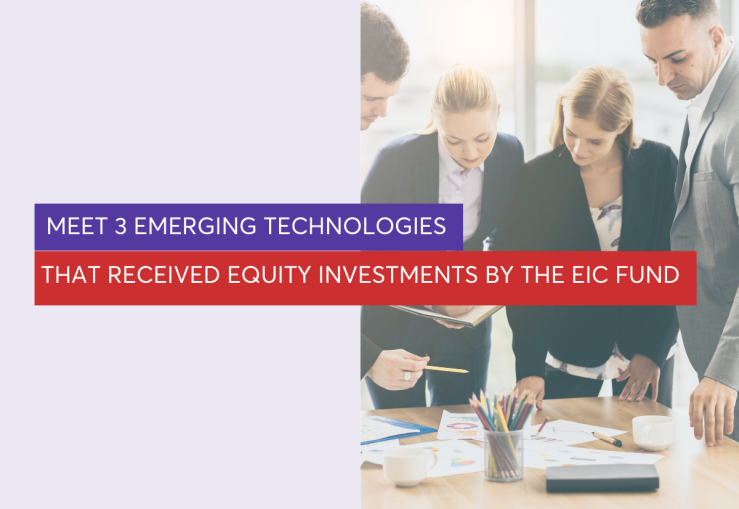The EIC is working hand in hand with the European deep tech community to enable Europe's most promising start-ups to scale up and reach global markets. From sustainable AI to quantum computing solutions, the EIC has been supporting innovations of strategic interest and bridging the funding gap when the market entry is at most in a pilot phase. The companies sensiBel, DyeMansion, and SiPearl are part of the EIC-backed companies list and recently received equity investments that will help shape their technologies' future. Discover more details about these 3 EIC innovators and how they are changing the tech of tomorrow.
sensiBel is bringing microphones with true studio-quality in a small size package
Most microphones used today are based on century-old technology, but the Norwegian startup sensiBel is breaking with the past by introducing its patented optical technology to the microphones to enable true studio-quality performance in a small size package. sensiBel’s patented optical MEMS technology is ideal for natural language voice-controlled user interface, teleconferencing systems, sound detection & recognitions systems, high-quality audio recordings, and Active Noise Cancelling (ANC) headsets. The unison feedback from the market is that sensiBel’s microphone fills a clear gap in the market.
In April, the startup announced a successful EUR 15 million funding round led by Germany’s TRUMPF Venture, including The European Council’s EIC Fund, Skagerak Capital, Investinor, and SINTEF Venture IV. According to the CEO of sensiBel, Sverre Dale Moen, the startup will use the funding to ramp up production and support development and research activities.
“We were told a few years back it would not be possible to make a MEMS microphone with 10 times better performance than today’s state-of-the-art MEMS microphones. We have proven today with our microphone that we have such a disruptive performance. We are looking forward to further developing the company with our experienced investors and a great team of employees into all markets where such performance is requested”, Sverre Dale Moen, CEO of sensiBel.
DyeMansion is turning 3D-printed raw parts into high-value products
From perfect-fit eyewear to personalized car interiors, DyeMansion’s technology enables the era of digital manufacturing where 3D-printed products become part of our everyday life. Starting in 2015 with the first industrial colouring solution for powder bed fusion parts, the Munich-based company extended its portfolio with advanced part cleaning and surfacing solutions for a broader range of 3D-printing technologies in the field of plastics.
In February, the startup secured €15 million in funding. DyeMansion has opted not to go for venture capital (VC) funding but is receiving €4 million from the European Innovation Council and €11 million from the European Investment Bank.
According to the CEO and Co-Founder of the company, Felix Ewald, this funding will help them to continuously develop high-quality industrial technologies and improve the 3D-printed products from their clients:
"With the funding we already introduced our new eco-friendly and highly industrial technology called "VaporFuse Surfacing" to the market. It delivers sealed and washable surfaces on 3D-printed parts. The funding helped us to accelerate the market entry and to deliver our machine to more than 6 countries up to now. We already developed another promising technology that we are just about to launch as well. All our activities are further steps to build the factories of the future together with our customers.", said Felix Ewald, CEO & Co-Founder of DyeMansion.
Last year, DyeMansion also achieved a record-breaking in Q4 after selling over 100 machines.
SiPearl is designing the microprocessor that will power Europe’s supercomputers
SiPearl is designing a high-performance, low-power microprocessor for European exascale supercomputers. This new generation of microprocessors will enable Europe to set out its technological sovereignty in strategic high-performance computing (HPC) markets such as artificial intelligence, medical research, or climate modelling. The company is closely collaborating with its 27 partners from the European Processor Initiative (EPI) consortium - leading names from the scientific community, supercomputing centres, and industry - which are its stakeholders, future clients and end-users.
The French start-up, SiPearl, was selected for support by the EIC Accelerator. In addition to a €2.5 million grant, the company will receive a €15 million equity investment to develop and scale up its breakthrough innovation in chip technology. This is part of a Series A financing round, through which the EIC Fund investment will catalyse more than €100 million with strategic and other public investors, which SiPearl will unveil soon.
SiPearl’s CEO and founder Philippe Notton noted that this funding will help them transform research investment into jobs in Europe. “This is a promising step forward for Europe’s commitment to technological sovereignty, which will benefit many technical sectors, including SiPearl. With the rapid growth of SiPearl that our Series A funding will help to fuel, we will fulfil our promise to turn research investment into industry and jobs in Europe”, concluded.
About the EIC Fund
The EIC Fund provides equity from €0.5m to €15m to breakthrough innovation companies selected for EIC Accelerator blended finance support (grant and equity). It is a unique entity owned by the European Commission and established to make direct equity investments in companies. Its goals are, among others, to bridge the funding gap for start-ups with seed capital to series B financing, where market entry is at most in a pilot phase, and to crowd in other investors, further sharing risks by building a large network of capital providers and strategic partners.

DISCLAIMER: This information is provided in the interest of knowledge sharing and should not be interpreted as the official view of the European Commission, or any other organisation.

